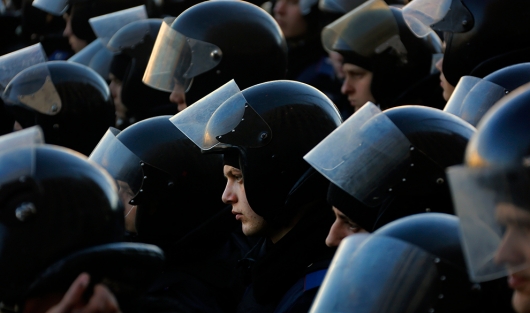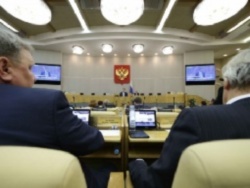Pavel Chikov
the head of the International human rights group “Agora”

More and more sectors of civil society is put before the fact of prohibition of activity. Helps free enforcement
The relationship of power structures to the civil society for the last four years can be called “active operational development”. The Ministry of internal Affairs, the RCDS, prosecutors, the FSB, the Federal service for financial monitoring focused on the collection and utilization of information on political activity and speech on the Internet, in the media, on the street, on the sources of funding of civil society activists and organizations. Public lectures are deprived of pre-leased halls, the organizers of the pickets and processions come across failures in the coordination of venues of actions.
The Federal financial monitoring service constantly increases the list of monitored Bank transfers. Crowdfunding is rapidly growing on the wave of growth of civil activity in 2011-2012, imploded due to the restrictive regulation of the Internet-translations. Actually banned the foreign funding of media and non-profit organizations, even if the funds of wealthy Russians, ready to support civil activity in the country. The most complex reporting requirements, huge penalties for any shortcomings and absolutely arbitrary enforcement essentially has criminalized foreign (outside the control of the Kremlin) investment in the civil sector.
The system of “watchdog control” automatically reports the movements of an increasing number of political and civil activists. A growing number of Pro-government movements, practicing repression against the opposition: the Orthodox radicals and the Cossacks added bikers and Chechen “youth organization”. The Arsenal of methods is wide: from shooting to throwing cakes and false reports about bombs.
On the Internet there are cybertronic. Grew a culture diverse in the eye on bloggers, on journalists, on a non-profit organization. Images of internal enemy kaleidoscopically follow each other: gays, “bellantoni” foreign agents, “agroforesty”.
Calls to interviews and surveys in the FSB and center “e” alternate with telephone threats, lawsuits about protection of honor and dignity, inspections by fire inspectors, tax service, justice Ministry, labor Inspectorate. Warning roskomnadzora are replaced by letters from the Federal drug control service and the Prosecutor’s office. Every public authority imagines itself to power Department and activates repressive function. Police officers are fighting for the right to bear arms, the FSB and the interior Ministry — for the right to shoot it to the crowd. The Federal tax service and Federal Agency on Affairs of nationalities want to block sites on the Internet, as is already done by a dozen other agencies.
Sverhnaglost any activity guarantees the presence of violations of the existing requirements cannot be performed due to their contradictions. The fines for these violations make the “cost of ownership” by any formal structures beyond.
In 2014 for the first time in 25 years began to decline, the number of registered nonprofit organizations. Data for last year yet, but clearly, the trend is preserved.
What is the response of society? The first shock after 2012 has long passed. Behind and stress, and indignation, and disappointment due there was, but dashed hopes of political change.
Now socially active citizens, not to mention the leaders of public and political associations, decide on a strategy for future behavior.
Dilemma No. 1 — personality — to remain in Russia and to risk of personal harassment or to emigrate. The latter option inevitably breaks another two to continue to work remotely or to abandon her and to withdraw completely from the civil sector. A new project of Mikhail Khodorkovsky “Open Russia” is managed from abroad. Part of the team Alexei Navalny received political asylum abroad. More than half of the members of the project Public Council Vladimir Ashurkov “Sanitation law” do not live in Russia.
Dilemma No. 2 — management to keep the organization or to continue their business informally. Both options have its drawbacks. Or a permanent increase in administration costs and security, or increase the personal risk in connection with the transition to informal status.
Dilemma No. 3 — behavioral — correct if his actions and statements under government pressure, whether to include self-censorship, to remain silent on important occasions. Top bloggers and journalists have become markedly more careful in the wording. A number of leading non-governmental organizations put the plugs on their sites, pointing out that “forced to stop updating the website”. Almost all media has closed comments on the sites.
Dilemma No. 4: value — to change the principles of the previous strategy. More and more spheres of activity have been politicized: human rights, ecology, education, sociology. The government constantly reiterates its own monopoly on any policy. There are only two positions — public and hostile. Mirror reflection of this dilemma is the extreme sensitivity of the environment in opposition to any evidence of cooperation with authorities. This was photographed with a confidant of the President, he discredited himself by getting money from loyal oligarch, the third entered the public Council at the police.
More and more sectors of civil society is put before the fact of the unqualified prohibition of activity. While not direct, but through arbitrary enforcement. “They continue to shape public opinion and attempt to leave the registry of foreign agents”, — explained the representative of the court of justice bases the elimination of Association “Agora”. The absence of foreign funding in the organization last year and a half, compliance with all reporting requirements and transparency and the legality of the intention to withdraw from the registry are not confused. The law has ceased to carry control function, he retained only the essence punitive.
Clearly this demonstrates the Runet.
We recently published its latest report on Internet freedom in Russia, covering the trends over the past 8 years. The number of users grows, however, already five years, the pace of growth is slowing. More and more users are leaving the Russian Internet services in foreign. Facebook wins “Vkontakte”, Google mail in Mail.Ru. Site owners prefer foreign hosting. The choice of foreign services in the presence of a Russian analogue is a kind of online escapism.
Power struggle for the loyalty of the largest sites. We see the change of owners of “Vkontakte” or redactions of the Tape.Roo and “Russian planet”. Roskomnadzor has increasingly forced online media to clean out “wrong” information. Against this background, we see a rapid development of methods of bypass of lock of sites. Built-in bypass modes in web browsers, a tenfold increase in the number of users secure browser tor, the demand for VPN protocols.
In the media field has been the trend for the refusal of registration as mass media. By law, the status of the media is giving journalists more opportunities, for example, the right to receive information in state agencies on-demand or protection for sources of information. There is a positive court practice on lawsuits against journalists. But today, the formal law is largely neutralized, and the status of the media entails more charges. The industry imposed limits of share of foreign owners and the supplementary statements for any foreign income.
Reacted to a hostile environment and the non-profit sector. The notorious registry of foreign agents, introduced in 2012, was filled by organizations in the last two years. It became clear that the reputational costs it will not be. The organization began to receive fines in the hundreds of thousands and even millions of rubles (the total amount of fines is known to more than 10 million rubles). NGOs began to refuse foreign funding. Even more spurred this process the adoption of the law on undesirable organizations, and the inclusion in the list of the first foreign charities. The actual ban did not exempt even the Russian benefactors, preserving capital abroad. Suffice it to recall the inclusion in the register of foreign agents of the Fund “Dynasty” Dmitry Zimin.
In 2015, it became clear that complete rejection of foreign funding does not protect against potential claims. Started a wave of assassinations of non-profit organizations. A similar reaction was a few years ago, when the government suddenly doubled the tax on individual entrepreneurs. Tens of thousands of people rushed to the IRS to cover their IP.
Once comfortable, the legal regime of non-profit organization has been to lose the benefits. To register NGOs much more difficult and more expensive than a normal limited liability company. Of the 70,000 applications on the registration of NGOs, the Ministry of justice in 2015, has approved only 16 000.
Infinite leapfrog with legislation, the decline in the economy of the third sector, in fact declared war on the authorities with NGOs excessively raised the eligibility threshold in the third sector. In the regions of verification and claims affect the organization in 3-5 years not conducted any financial activities. Increasingly there are informal movements working without registration (“Voice”, “Agora”, “Team 29”).
Major non-governmental organizations that are migrating, often with bands. Non-profit emigration is increasing significantly in the last couple of years. The Russian public figures actively adopt Belarusian experience. Many Belarusian NGOs registered in Vilnius, ibid., for example, is hosted by the Belarusian human rights house. In Russia the activities of public associations are still allowed without registration as legal entities In Belarus is a separate offense.
The financial activities of informal groups, of course, is much less transparent, gradually retreating into the shadow. It is easier to receive income on the account of an individual, providing tax return and paying 13% tax, not reporting on the content of their work than on a quarterly basis to report to the Ministry of justice, leading the accounting Department, once a year spending at its expense, audit and risk millions in fines.
Not many advantages of NCO — five years after the creation (and far from any NGO) to be eligible to become the members of public Supervisory commissions. While candidates are actively ruble regional and Federal public chamber for disloyalty, and visits to prisons are not funded. Another authority — for environmental organizations, there is a right to conduct environmental expertise of facilities. Them however almost no one in power takes seriously.
Abandoning organizational structures, established civic education are transformed into informal networks of individuals. To neutralize them, the authorities will have to soon move to the level of personal persecution. This will require further tightening of legislation and a significant increase repression. But civilian leaders who have decided to stay in the country, has already made an informed choice. Political leaders, like Ilya Yashin and Alexei Navalny, almost daily demonstrate personal courage — engaging in a public confrontation with Ramzan Kadyrov, Vladimir Putin, Urea Chaika and Alexander Bastrykin. Crystallizes group of public associations, adopted by the authorities abandoned the challenge and continue to work in the new environment. Russian civil society cringed and turned on the survival mode. It accumulates the growth potential that might work at the first signs of spring.








